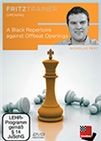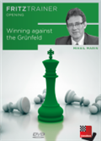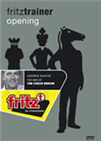It takes two to tango
Predicting that Jan-Krzysztof Duda and Alireza Firouzja would showcase sharp chess in their direct encounter was a safe bet to make before round seven of the Prague Masters Tournament. Although we already got used to see Duda in top-notch events, we should not forget that he is still quite young and that he has a rather adventurous playing style. Of course, he is nevertheless five years older than Firouzja, who has risen through the ranks at astronomical speed, becoming the talk of the town among chess enthusiasts.
Playing White, Duda used a line he had employed against Robert Hovhannisyan at the 2018 World Rapid Championship. Despite knowing the position from his own game, he thought for 17 minutes before repeating the eighth move he had played a little over a year ago:
 Many club players have their favourite pet opening variations which aren’t necessarily main lines. It’s important to know how to handle these variations as your opponent will likely know his systems well. In this DVD, GM Nicholas Pert provides a detailed Black repertoire against many of these Offbeat Opening choices.
Many club players have their favourite pet opening variations which aren’t necessarily main lines. It’s important to know how to handle these variations as your opponent will likely know his systems well. In this DVD, GM Nicholas Pert provides a detailed Black repertoire against many of these Offbeat Opening choices.
The most common continuation here is 8.cxd5 cxd5 9.♘b5, entering a strategic battle. Duda's 8.♗e2, on the other hand, leads to complications after 8...e4, as was clear by the fact that the Polish once again spent over 17 minutes on his ninth move, 9.♘g5. Firouzja continued with the natural 9...h6, to which Duda answered with 9...h4. Naturally, the computer already gives Black a considerable advantage, but he must walk a tightrope to reach a point in which the edge can be materialized.
Firouzja was up to the task, expanding on the kingside while keeping his opponent confined on his own camp. The youngster got to infiltrate White's position on move 33:
Duda's position is about to collapse, as Firouzja had correctly calculated that after 33...♜xd2 34.♖xc6 Black has 34...♝d7 and White has no acceptable way to continue. The Polish grandmaster went for 35.♖g6+, but after 35...♚h7 36.♕c1, pinning the rook with 36...♝e8 effectively ends the game. Duda played three more moves before giving up. A commanding performance by the wunderkind.

Deciding which sharp line to go for this time? — Jan-Krzysztof Duda | Photo: Vladimir Jagr
Deep preparation by Sam Shankland was on display for a second day in a row. Facing Nils Grandelius' Grünfeld, the former US champion got a clear edge on the clock by the time a complex middlegame continued to present both players with tough practical questions. The position lent itself to sharp tactical possibilities:
 The Grünfeld is a highly dynamic opening in which Black's position often seems to hang together by a single thread; and yet, this apparently precarious equilibrium appears to be enough to make it entirely viable — up to the highest level.
The Grünfeld is a highly dynamic opening in which Black's position often seems to hang together by a single thread; and yet, this apparently precarious equilibrium appears to be enough to make it entirely viable — up to the highest level.
White could have opted for 25.♗xg5 here, as Black needs to give back the piece after 25...fxg5 26.f6 if he wants to avoid facing a couple of connected passers that will make his life miserable. Instead, Shankland played 25.♖d2 in order to activate his bishop — 25...♛c4 26.♗d6.
At this point, the computer gave a relatively balanced evaluation, but it's plain to see that Black is the one with a rough road ahead — his minor pieces need a couple of tempi to find better squares. Grandelius was holding up though, until he faltered decisively on move 33:
33...♝e7 fails against the forcing 34.♖c7. Grandelius had planned to give up his queen with 34...♝xd6 35.♖xf7, counting on 35...♝c5+ but perhaps missing that 36.♖d4 is a strong response to the check. The game continued 36...♝xd4+ 37.cxd4 ♞d6 38.♕e2 ♞xf7 and White managed to consolidate his superior position with 39.dxe5. Resignation came six moves later.
In the diagrammed position, notice that after 33...♝e7 34.♖c7 Black's best chance is 34...♞xd6, but White keeps up the pressure with 35.♖xd6 ♜xd6 36.♕xa8 (the queen attacking the rook from e4 is key in the calculations) and it is all but impossible to save this position from the black side.

The round is about to begin | Photo: Petr Vrabec
Shankland had failed to convert his edge against Markus Ragger in round six, while it was David Anton who could not finish off the Austrian on Wednesday. Ragger played the Benoni with Black and got a good position out of the opening, even forcing White to put his knight on h1 at some point. When the position opened up on the kingside, however, Anton got an increasingly pleasant position, as he had better control of the g and h-files.
By move 35, the computer gave White a decisive advantage:
 The Czech Benoni has never quite made it to the top of the charts as a reply to 1 d4. Perhaps it‘s the very nature of blocked central positions which put people off. Thus, after 1.d4 Nf6 2.c4 c5 3.d5 e5 the first impression is that the Black position could become rather passive. However, players of the calibre of Nisipeanu, and Ivan Sokolov revived the opening by using the Czech Benoni with success.
The Czech Benoni has never quite made it to the top of the charts as a reply to 1 d4. Perhaps it‘s the very nature of blocked central positions which put people off. Thus, after 1.d4 Nf6 2.c4 c5 3.d5 e5 the first impression is that the Black position could become rather passive. However, players of the calibre of Nisipeanu, and Ivan Sokolov revived the opening by using the Czech Benoni with success.
Anton's 36.♖g5 is good, but the more direct 36.♖hg2, targeting g6, was better. The Spaniard surely saw 36...♝f5 and missed the fact that after 37.exf5 ♜xe2+ 38.♖xe2 ♛a1+ 39.♔f2 ♛d4+ 40.♔f1 ♛a1+ he can escape the perpetual with 41.♘b1 ♛xb1+ 42.♕e1. We show this lengthy variation to demonstrate how tough it was for White to find a line that prevented Black from finding a triple repetition, especially with the clock dangerously ticking down!
After the text, there followed 36...♞xd5 37.♖xe5 ♞e3, and Anton erred with 38.♖xe8+, as Black found 38...♛a1+ 39.♔f2 ♞d1+ 40.♔g2 ♞e3+ 41.♔f2, etcetera. Notice the key role of Black's d7-bishop, which controls the escape square on h3. Draw.

David Anton almost got his second win of the event | Photo: Vladimir Jagr
In the meantime, David Navara played his creative brand of chess with White against Nikita Vitiugov, but correct play by both sides led to a 42-move draw, while Vidit tried to make something out of his white game against Harikrishna but could not prevent his opponent from tactically forcing a repetition starting on move 24.
Standings after Round 7
Replay all games
Links
























